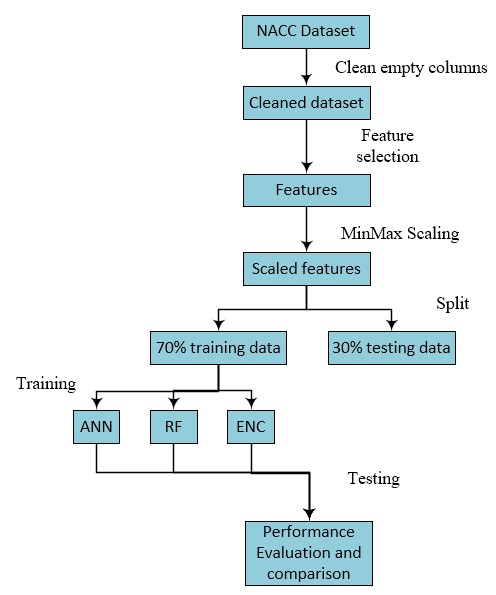Analysis of Machine Learning Models to Automate the Early Detection of Alzheimer Disease
Keywords:
Alzheimer’s Disease, Machine Learning, Classification Algorithms, Artificial Intelligence in HealthcareAbstract
Alzheimer's disease is an advanced neurological illness that primarily affects those over 65. It is characterized by memory loss and cognitive deterioration. Although there isn't a known cure, early intervention can greatly delay the disease's progression, which emphasizes how crucial a prompt and precise diagnosis is. Early-stage identification is still a difficult and time-consuming procedure, though. This study uses machine learning (ML) to improve and speed up Alzheimer's disease detection. The National Alzheimer's Coordinating Center (NACC) dataset, which consists of clinical and genomic data, was subjected to three ML algorithms: Elastic Net Classifier (ENC), Random Forest (RF), and Artificial Neural Network (ANN). Unlike established methodologies that largely rely on Magnetic Resonance Imaging (MRI) paired with other modalities, this research highlights the utilization of limited datasets and comparatively underexplored clinical-genomic data. The models were trained and assessed using the Scikit-learn and Tensor Flow frameworks. With an accuracy, F1 score, and recall of 92%, ANN outperformed the other models, indicating its potential for early Alzheimer's identification. This study demonstrates the feasibility of addressing difficulties in early-stage Alzheimer's diagnosis by combining clinical and genomic data with machine learning algorithms.
References
A. Dementia, “Alzheimer’s Disease Facts and Figures,” Alzheimer’s Assoc., 2019, [Online]. Available: https://www.alz.org/alzheimers-dementia/facts-figures
R. R. Janghel and Y. K. Rathore, “Deep Convolution Neural Network Based System for Early Diagnosis of Alzheimer’s Disease,” IRBM, vol. 42, no. 4, pp. 258–267, Aug. 2021, doi: 10.1016/J.IRBM.2020.06.006.
U. Kumar and U. Kumar, “Applications of Machine Learning in Disease Pre-screening,” https://services.igi-global.com/resolvedoi/resolve.aspx?doi=10.4018/978-1-5225-7131-5.ch010, pp. 278–320, Jan. 1AD, doi: 10.4018/978-1-5225-7131-5.CH010.
S. D. Nonie Alexander, Daniel C. Alexander, Frederik Barkhof, “Identifying and evaluating clinical subtypes of Alzheimer’s disease in care electronic health records using unsupervised machine learning,” BMC Med. Informatics Decis. Mak. Vol., vol. 21, no. 343, 2021, doi: https://doi.org/10.1186/s12911-021-01693-6.
D. A.-J. Abbas Saad Alatrany, Wasiq Khan, Abir Hussain, Hoshang Kolivand, “An explainable machine learning approach for Alzheimer’s disease classification,” Sci. Rep., vol. 14, no. 2637, 2024, doi: https://doi.org/10.1038/s41598-024-51985-w.
M. D. W. Janani Venugopalan, Li Tong, Hamid Reza Hassanzadeh, “Multimodal deep learning models for early detection of Alzheimer’s disease stage,” Sci. Rep., vol. 11, no. 3254, 2021, doi: https://doi.org/10.1038/s41598-020-74399-w.
S. K. Shagun Sharma, Kalpna Guleria, Sunita Tiwari, “A deep learning based convolutional neural network model with VGG16 feature extractor for the detection of Alzheimer Disease using MRI scans,” Meas. Sensors, vol. 24, p. 100506, 2022, doi: https://doi.org/10.1016/j.measen.2022.100506.
S. Murugan et al., “DEMNET: A Deep Learning Model for Early Diagnosis of Alzheimer Diseases and Dementia from MR Images,” IEEE Access, vol. 9, pp. 90319–90329, 2021, doi: 10.1109/ACCESS.2021.3090474.
D. P. Vasco Sá Diogo, Hugo Alexandre Ferreira, “Early diagnosis of Alzheimer’s disease using machine learning: a multi-diagnostic, generalizable approach,” Alzheimers. Res. Ther., vol. 14, no. 107, 2022, doi: https://doi.org/10.1186/s13195-022-01047-y.
T. M. Ghazal et al., “Alzheimer Disease Detection Empowered with Transfer Learning,” Comput. Mater. Contin., vol. 70, no. 3, pp. 5005–5019, Oct. 2021, doi: 10.32604/CMC.2022.020866.
S. Naz, A. Ashraf, and A. Zaib, “Transfer learning using freeze features for Alzheimer neurological disorder detection using ADNI dataset,” Multimed. Syst., vol. 28, no. 1, pp. 85–94, Feb. 2022, doi: 10.1007/S00530-021-00797-3/METRICS.
A. Bron, E. E., Klein, S., Papma, J. M., Jiskoot, L. C., Venkatraghavan, V., Linders, J., Aalten, P., De Deyn, P. P., Biessels, G. J., Claassen, J. A., Middelkoop, H. a. M., Smits, M., Niessen, W. J., Van Swieten, J. C., Van Der Flier, W. M., Ramakers, I. H., “Cross-cohort generalizability of deep and conventional machine learning for MRI-based diagnosis and prediction of Alzheimer’s disease,” NeuroImage Clin., vol. 31, p. 102712, 2021, doi: https://doi.org/10.1016/j.nicl.2021.102712.
A. J. Jo, T., Nho, K., Bice, P. J., & Saykin, “Deep learning-based identification of genetic variants: Application to Alzheimer’s disease classification,” Brief. Bioinform., 2022, doi: https://doi.org/10.1101/2021.07.19.21260789.
R. Odusami, M., Maskeliūnas, R.,Damaševičius, “Pixel-Level Fusion Approach with Vision Transformer for Early Detection of Alzheimer’s Disease,” Electronics, vol. 12, no. 5, p. 1218, 2023, doi: https://doi.org/10.3390/electronics12051218.
P. D. Abhibhav Sharma, “A machine learning approach to unmask novel gene signatures and prediction of Alzheimer’s disease within different brain regions,” Genomics, vol. 113, no. 4, pp. 1778–1789, 2021, doi: https://doi.org/10.1016/j.ygeno.2021.04.028.
Research & Funding, “National Alzheimer’s Coordinating Center,” Div. Neurosci., [Online]. Available: https://www.nia.nih.gov/research/dn/national-alzheimers-coordinating-center-nacc

Downloads
Published
How to Cite
Issue
Section
License
Copyright (c) 2025 50SEA

This work is licensed under a Creative Commons Attribution 4.0 International License.




















